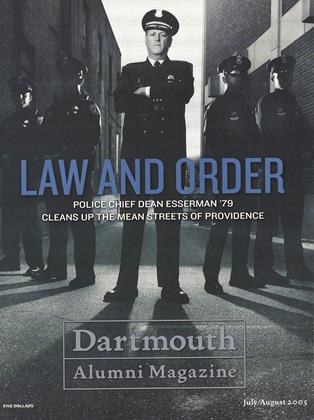QUOTE/ UNQUOTE "Preschoolers at Dartmouth Day Care can compost. Dartmouth students had their composting bins taken away after being consistently unable to separate plastic from paper and food." —SALLY C. NEWMAN '05, IN A LETTER TO THE DARTMOUTH MAY 5
NOT TO BE OUTDONE BY BOSTON, Dartmouth has its own Big Dig underway The College isn't only updating its appearance—it's altering the way it builds.
In the late 1990s Dartmouth made a commitment to "green building"— taking environmental concerns into account in all construction planning. McCulloch dorm was the first project to receive such consideration when the College brought in Marc Rosenbaum, a local engineering advisor, as a consultant. Now, all four of Dartmouth's major new developments—the McLaughlin cluster and Tuck Mall residence halls, the Haldeman/Kemeny Center (behind Baker/Berry) and Thayer's Mac Lean Engineering Sciences Center—are taking environmental concerns into account. They are expected to receive silver certification by the Leadership in Energy and Environmental Design (LEED) program created by the U.S. Green Building Council (USGBC).
A "voluntary national standard for developing high-performance, sustainable building," according to its Web site, LEED certification involves following a detailed checklist that incorporates environmental sensibilities from a buildings inception.
The McLaughlin cluster (expected to open in fall 2006 north of Maynard Street), will have what is believed to be the nations only radiant heating and cooling system located in the floor/ceiling of a dormitory, and the dorm on Tuck Mall will have gethermal heating/cooling systems fed from two 1,500-foot gewells.
LEED isn't popular only on campus. Malcolm Lewis, Th'71 director of the UGBC between 1997 and 2000, was instrumental in creating the LEED program and writing the standards. Another Dartmouth alum, architect William McDonough '73. perhaps the best known "green architect," has worked on the other end—popularizing green building practices through his projects and his writing.
The point of the standards, according to David Eckels, Dartmouth's director of residential operations, is to reduce the size and cost of climate-control systems while not increasing the overall cost of the building—which usually requires some technological innovation, especially with Hanover's cold winters. Special grants are available, however, for any increases. Kemeny Hall was awarded an extra $150,000 from the Kresge Foundation contingent upon the project achieving certification.
Green Squared New buildings, includingthe Tuck Mall residence hall depictedbelow, adhere to eco-friendly standards.
 View Full Issue
View Full Issue
More From This Issue
-
 Cover Story
Cover StoryPolice Chief Dean Esserman ’79 Restores Law and Order to the City of Providence
July | August 2005 By DIRK OLIN ’81 -
 Feature
FeatureMud, Madras and Madness!
July | August 2005 By Gina Barreca ’79 -
 Feature
FeatureGreenhouse Effect
July | August 2005 By ABIGAIL KLINGBEIL ’97 -
 Feature
FeatureNotebook
July | August 2005 By JOHN SHERMAN -
 Feature
FeatureAlumni News
July | August 2005 By Thomas Vieth '80 -
 FACULTY
FACULTYLearning Curve
July | August 2005 By James Heffernan
Sue DuBois '05
-
 Article
ArticleFanning the Flames
Mar/Apr 2004 By Sue DuBois '05 -
 Article
ArticleThe 10 Most Coveted Jobs On Campus
May/June 2004 By Sue DuBois '05 -
 Article
ArticleAnd the Answer Is...
Jan/Feb 2005 By Sue DuBois '05 -
 Article
ArticleClass of 1916
Jan/Feb 2005 By Sue DuBois '05 -
 Article
ArticleClass of 1965
Mar/Apr 2005 By Sue DuBois '05 -
 Article
ArticleThe Advocate
Mar/Apr 2005 By Sue Dubois '05







